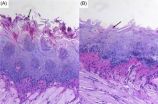(Press-News.org) Human mouths contain a balanced mix of microbes which, when disrupted, can lead to oral diseases. A study published on March 13th in PLOS Pathogens compares the bacteria and fungi present in the mouths of healthy individuals with those from patients infected with HIV, and illustrates why oral candidiasis (aka "thrush") is a common complication of HIV infection.
Using high-throughput gene sequencing, Mahmoud Ghannoum, from Case Western Reserve University in Cleveland, USA, and colleagues catalogued the core oral bacteriome (the bacteria commonly present) and the core oral mycobiome (the fungi commonly present). They found little difference in the bacteria between healthy individuals and those infected with HIV (whose immune systems are compromised). In contrast, they saw clear and consistent differences in the oral fungi between both groups.
A family of fungi called Candida was predominant in both groups, but present at higher levels in HIV-infected individuals. A second one, called Pichia, was present at fairly high levels in the mouths of healthy individuals but only at lower levels in people who were infected with HIV. This led the researchers to speculate that there was an antagonism between the two. And indeed, when they grew Pichia alone in a liquid medium and then filtered the fungus out, the "Pichia spent medium" (or PSM) was able to suppress the growth of Candida as well as several other disease-causing fungi.
Oral candidiasis is a common opportunistic infection in patients with HIV/AIDS, and even in the era of effective antiretroviral therapy, it compromises the quality of life of many patients. Making use of a mouse model of oral candidiasis, the researchers were able to show that mice treated with PSM had much less severe symptoms compared with untreated ones. Therefore, at least in this animal model, Pichia's antagonism of Candida can suppress oral candidiasis.
The authors say, "Our findings have wide implications regarding the discovery of novel antifungal agents and will open the way to new therapeutic approaches for the management of fungal infections". They continue , "Detailed investigations are warranted to purify and characterize the specific Pichia factor(s) that can inhibit Candida and other disease-causing fungi."
INFORMATION:
CONTACTS:
Mahmoud Ghannoum
e-mail: Mahmoud.ghannoum@case.edu
phone: +1.216.844.8580
Funding: This study was supported by funds from the NIDCR to MAG [RO1DE17846 and the Oral HIV AIDS Research Alliance (OHARA), grant number BRS-ACURES-11-000049-110229], NIAID/NEI to PKM (NEI/R21EY021303 and NIAID/R21AI074077), pilot funding from the Infectious Diseases Drug Development Center (IDDDC, Case) to PKM, and the CWRU/UH Center for AIDS Research (CFAR, NIH grant number P30 AI036219). The funders had no role in study design, data collection and analysis, decision to publish, or preparation of the manuscript.
Citation: Mukherjee PK, Chandra J, Retuerto M, Sikaroodi M, Brown RE, et al. (2014) Oral Mycobiome Analysis of HIV-Infected Patients: Identification of Pichia as an Antagonist of Opportunistic Fungi. PLoS Pathog 10(3): e1003996. doi:10.1371/journal.ppat.1003996
COI: The authors have declared that no competing interests exist.
Link to the article: (link goes live upon article publication) http://dx.plos.org/10.1371/journal.ppat.1003996
Image link: http://www.plos.org/wp-content/uploads/2013/05/PLOS_Pathogens_Ghannoum_Mar13_IMG.tif
Image caption: Treatment of mice with PSM reduces the extent of tissue invasion by Candida (see arrows) in the tongue. (A) untreated, (B) PSM treated.
Image credit: Mahmoud Ghannoum
Additional Authors:
Pranab K. Mukherjee, Case Western Reserve University, Ohio
Jyotsna Chandra, Case Western Reserve University, Ohio
Mauricio Retuerto, Case Western Reserve University, Ohio
Masoumeh Sikaroodi, George Mason University, Virginia
Robert E. Brown, George Mason University, Virginia
Richard Jurevic, George Mason University, Virginia
Robert A. Salata, Case Western Reserve University, Ohio
Michael M. Lederman, Case Western Reserve University, Ohio
Patrick M. Gillevet, George Mason University, Virginia
Mahmoud A. Ghannoum, Case Western Reserve University, Ohio
Fighting for oral dominance: Good fungi keep bad ones in check in healthy mouths
2014-03-13
ELSE PRESS RELEASES FROM THIS DATE:
Autism and intellectual disability incidence linked with environmental factors
2014-03-13
An analysis of 100 million US medical records reveals that autism and intellectual disability (ID) rates are correlated at the county level with incidence of genital malformations in newborn males, an indicator of possible congenital exposure to harmful environmental factors such as pesticides.
Autism rates—after adjustment for gender, ethnic, socioeconomic and geopolitical factors—jump by 283 percent for every one percent increase in frequency of malformations in a county. Intellectual disability rates increase 94 percent. Slight increases in autism and ID rates are ...
Microorganism shows promise in inhibiting thrush
2014-03-13
Scientists at Case Western Reserve School of Medicine and University Hospitals (UH) Case Medical Center have discovered how the beneficial fungal yeast, Pichia, holds at bay a harmful fungal yeast, Candida. The hope for this finding is that components in Pichia could one day become therapeutic agents to stave off not only thrush, but also other life-threatening systemic fungal infections. Research findings about the effect of oral Pichia on Candida appear in the March 13 edition of PLOS Pathogens.
"Our aim was to try to understand what microorganisms live in our mouths. ...
Negative effects of joining a gang last long after gang membership ends
2014-03-13
Imagine two children, both with the exact same risk factors for joining a gang. As teenagers, one joins a gang, the other doesn't. Even though the first teen eventually leaves the gang, years later he or she is not only at significantly higher risk of being incarcerated and receiving illegal income, but is also less likely to have finished high school and more likely to be in poor health, receiving government assistance or struggling with drug abuse.
University of Washington researchers have found that joining a gang in adolescence has significant consequences in adulthood ...
Stroke survivors may lose month of healthy life for 15-minute delay in treatment
2014-03-13
Every 15-minute delay in delivering a clot-busting drug after stroke robs survivors of about a month of disability-free life, according to a new study in the American Heart Association journal Stroke.
On the other hand, speeding treatment by just one minute means another 1.8 days of healthy life, researchers said.
"'Save a minute; save a day' is the message from our study, which examined how even small reductions in treatment delays might benefit patients measurably in the long run," said Atte Meretoja, M.D., Ph.D., M.Sc., lead author of the study and associate professor ...
Mexican-Americans suffer worse outcomes after stroke
2014-03-13
Mexican-Americans had worse neurologic, functional and cognitive outcomes 90 days after stroke compared to non-Hispanic whites, in a study reported in the American Heart Association journal Stroke.
Mexican-Americans have increased stroke risk, but lower risk of death compared to non-Hispanic whites. The new research suggests that prolonged survival is at the expense of increased disability.
The study's stroke participants were drawn from the Brain Attack Surveillance in Corpus Christi (BASIC) project conducted in a non-immigrant south Texas community. Researchers assessed ...
Religious beliefs of American Muslims influence attitudes toward organ donation
2014-03-13
American Muslims who interpret negative events in life as punishment from God are less likely to believe that donating organs after death is ethical than those with a more positive outlook, according to a survey conducted by researchers from the University of Chicago's Program on Medicine and Religion.
The study points to a complex relationship between attitudes toward organ donation and the Islamic faith. Previous research has shown that Muslims are less likely than other religious groups to believe organ donation is ethically justified, and suggests that religious values ...
Falls among elderly reduced by state program
2014-03-13
PITTSBURGH, March 13, 2014 – A low-cost program reduced falls in the elderly by 17 percent statewide, illustrating the value and effectiveness of using existing aging services, such as senior centers, in preventing falls, a University of Pittsburgh Graduate School of Public Health study determined.
Pitt Public Health researchers followed nearly 2,000 older Pennsylvanians between 2010 and 2011 to determine the effectiveness of the state's Healthy Steps for Older Adults, a voluntary fall-prevention program. Results of the study, funded by the U.S. Centers for Disease Control ...
Simple EMG classification can improve outcome of nerve transfer surgery
2014-03-13
A study by researchers at Hospital for Special Surgery (HSS) finds that electromyography (EMG) testing to determine the quality of donor nerves can improve the outcome of nerve transfer surgery to restore function in patients with a brachial plexus injury. EMG is a sophisticated test used to objectively measure muscle and nerve function.
The paper, "Does Pre-operative Donor Nerve Electromyography Predict Nerve Transfer Outcomes?," will be presented at the annual meeting of the American Academy of Orthopaedic Surgeons on March 13 in New Orleans.
"Our study found that ...
Innovative solar-powered toilet developed by CU-Boulder ready for India unveiling
2014-03-13
A revolutionary University of Colorado Boulder toilet fueled by the sun that is being developed to help some of the 2.5 billion people around the world lacking safe and sustainable sanitation will be unveiled in India this month.
The self-contained, waterless toilet, designed and built using a $777,000 grant from the Bill & Melinda Gates Foundation, has the capability of heating human waste to a high enough temperature to sterilize human waste and create biochar, a highly porous charcoal, said project principal investigator Karl Linden, professor of environmental engineering. ...
Husband's health and attitude loom large for happy long-term marriages
2014-03-13
A husband's agreeable personality and good health appear crucial to preventing conflict among older couples who have been together a long time, according to a study from University of Chicago researchers.
The report found that such characteristics in wives play less of a role in limiting marital conflict, perhaps because of different expectations among women and men in durable relationships.
"Wives report more conflict if their husband is in poor health," said the study's lead author, James Iveniuk, PhD candidate in the Department of Sociology. "If the wife is in poor ...

